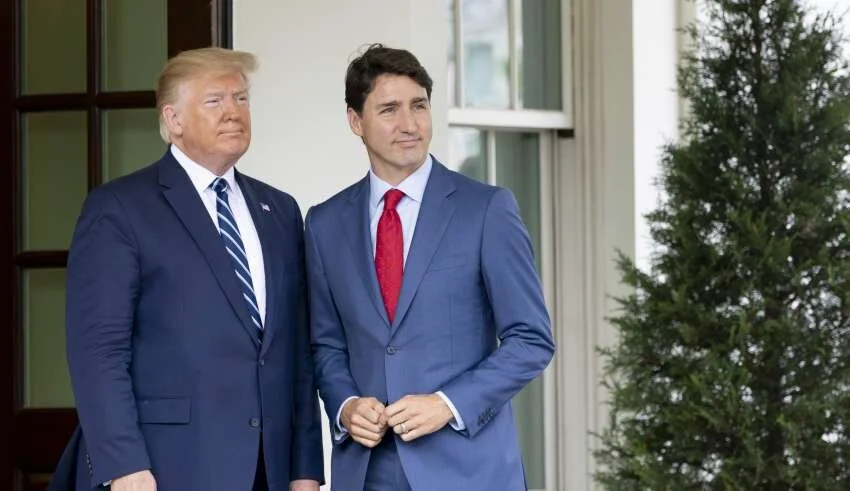OPINION: What Trudeau’s election means for Trump in 2020
Opinion writer Zach Richards, a sophomore studying education, argues that Prime Minister Justin Trudeau and President Donald Trump share a lot of the same electoral advantages and disadvantages and that his reelection is a good sign for Trump.
Please note that these views and opinions do not reflect those of The New Political.
Last week, Canadian Prime Minister Justin Trudeau won reelection for a second term, which should be a point of reassurance to anyone who wants to see four more years of Trump.
This might seem counterintuitive at first, as Trudeau belongs to the center-left Liberal Party and Trump the right-wing Republican Party. Nonetheless, their paths to reelection could end up looking the same, as they share many of the same advantages and disadvantages of helping or hurting their reelection odds.
As far as advantages, Trudeau and Trump are both incumbents during an economic upswing. Whether it be in the legislative or executive branch, incumbents generally have an advantage. A first-time prime minister with a parliamentary majority hasn’t lost reelection in Canada in 84 years — the last time it happened was in the midst of the Great Depression.
Likewise, no American president has lost reelection since 1992. No president has lost reelection with a good economy since 1912 and even that was a unique result of a viable third party, something unlikely to happen in 2020. Incumbency doesn’t always help, especially when the economy is bad. However, the global economy is working relatively well so far and that serves to benefit both Trudeau and Trump.
Trump and Trudeau also benefit from an archaic electoral system that benefits their parties, allowing them to win reelection while losing the popular vote.
Prime ministers in Canada are not directly elected. Instead, the country is divided into 338 seats, with each seat voting for a candidate from each party. The head of the party that wins the most seats becomes the prime minister. However, it doesn’t matter if a party wins a seat overwhelmingly with 85% of the vote or a 40% plurality. Either way, that’s just one seat. Any votes beyond what is needed for a plurality victory are simply wasted.
The Conservative Party’s problem is that they rack up victories with 80% or 85% of the vote in a lot of rural seats, but even the Liberal Party’s most liberal seats don’t vote them in that overwhelmingly. Because the Liberal Party’s votes are more evenly distributed, Justin Trudeau and his party were able to win reelection with only 33% of the popular vote and more than 200,000 votes fewer than his opponent Andrew Scheer.
Trump has this same advantage with the electoral college. The electoral college doesn’t always benefit Republicans; it actually benefited Democrats in 2004, 2008 and 2012. Nonetheless, Trump was able to put together a coalition that let him win in 2016 despite losing the popular vote by almost three million. There’s little doubt he could do it again in 2020.
Another advantage Trump and Trudeau might share is charisma. Charisma is a tricky thing to talk about as it’s very subjective and is often a way to use a candidate’s sex or race against them. Nonetheless, it’d be hard to argue that Trudeau had less charisma than his primary opponent Scheer.
Depending on whom the Democrats nominate, Trump may end up with that same advantage. It’s hard to just explicitly say that Trump had more charisma than Hillary Clinton in the 2016 election as that leads to questions of what role sex plays in a candidate’s likability. However, it seems there was a general media narrative that Clinton was running with a charisma deficit — something that could very well hurt the Democrats again in 2020.
Trudeau and Trump share a lot of the same disadvantages too, and the fact that Trudeau overcame them is a great sign for Trump.For one, they both have low approval ratings. The main difference is that Trudeau started his term as prime minister with high approval while Trump has always been relatively unpopular. Nonetheless, they arrived at a similar place, with Trudeau polling in the mid-40s and Trump in the low-40s.
Trudeau and Trump are also both very divisive figures. That’s not to draw a false equivalence between them ー Trump is far worse. Nonetheless, members of the Conservative Party fervently dislike Trudeau, and there was even an informal conversation that the heavily conservative provinces of Alberta and Saskatchewan should secede. That’s almost certainly not going to happen, but the Canadian right adopted some of the “resistance” language of the American left, representing a similar level of distaste for their current leaders. If Trudeau can overcome this, then Trump may be able to as well.
Finally, there’s the corruption element. Nothing Trudeau has done rises to the level of, say, pressuring a foreign leader to help his own reelection campaign and possibly compromising national security in doing so. Nonetheless, Trudeau allegedly fired his attorney general for refusing to avoid prosecuting a Quebec construction company. Trudeau has denied the worst parts of the allegations, but if he can overcome this and a blackface scandal, then Trump might just keep enough of his base in line to prevent a 2020 loss.
None of this is to say that Trump will definitely win reelection in 2020. The election is a year away, and it’d be foolish of either the Democrats or Republicans to just assume that their victory is assured. Trudeau’s victory certainly isn’t a bad sign, and if he can pull it off, Trump might just be able to as well.

